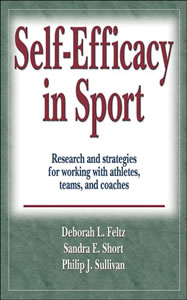 Self-Efficacy
in Sport - Research and strategies for
working with athletes, teams, and coaches Self-Efficacy
in Sport - Research and strategies for
working with athletes, teams, and coaches
Pub. Date:
ISBN:
0736059997
Edition
Description: 416pp, hardback,
2008
Authors:
Deborah L. Feltz, Sandra Short, Philip
Sullivan
Reviewer: Heather Brownlee
The material presented in this book covers
all aspects of self-efficacy in sport,
beginning with what it is and how it develops,
and ending with how to teach self-efficacy
and even change it. I learned at the beginning
of the book that self-efficacy means the
ability to judge one's own capabilities
and be able to set goals for personal
behaviors. Particularly in sports, self-efficacy
relates to how you play the game and how
you feel about how you play the game.
It also deals with how coaches affect
player's skills and goal setting.
This book was easy to read because it
was so intriguing (though lengthy at times).
I believe it will be especially interesting
for athletes or past athletes. I found
myself desiring to read more to help me
understand my own self-efficacy, as well
as learning methods to help my future
students develop their self value.
I found this book to be very beneficial
for the college audience, specifically
for those studying courses in Kinesiology,
Sports Science, and especially Sports
Physiology. The book made very valid points
concerning efficacy's effect on sports
in general, and particularly athlete's
mind set while participating in sports
and related activities. I learned that
personal perceptions and abilities can
affect many things, from the way I participate
in sports to the goals I set for myself.
I found the information in Section III
from the first chapter entitled "Enhancing
Efficacy Beliefs of Athletes" to
be very beneficial. It breaks down enhancing
efficacy into 3 sections: 1) for athletes,
2) for teams, and 3) for coaches. These
sections explain in great detail about
how providing positive influences and
feed back can be very beneficial to athletes,
especially for students and younger athletes
who need the encouragement the most. These
practices help enhance the confidence
necessary to be a good athlete. I found
the techniques listed in these 3 sections
to be particularly interesting.
The book provided great examples of separate
and unique situations and instructional
strategies for enhancing student's confidence
in each of those situations. These strategies
included methods for providing adequate
and appropriate feedback to students to
encourage their behaviors and attitudes,
as well as how to model, use imagery,
and teach goal setting. The book describes
how to use, explain, and teach each technique
to novice athletes. I know I will be able
to use this information very effectively
in my future career.
I would rate this book a 3 ½ on
a scale of 1-5.
resources: other reviews
|



